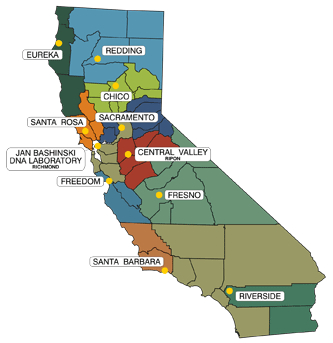Subscribe to Our Newsletter


The Bureau of Forensic Services (BFS) regional laboratory system was established in 1972 to provide assistance to local law enforcement agencies that did not have access to local crime laboratory services. Today, BFS is a comprehensive, state-of-the-art system accredited by the ANSI National Accreditation Board (ANAB) in the field of forensic testing for those activities listed on the scope of accreditation. The BFS system serves 46 of the state's 58 counties. BFS operates 10 regional crime laboratories for which forensic scientists collect, analyze, interpret, and compare physical evidence from suspected crimes. In addition, the Jan Bashinski Laboratory in Richmond houses the DNA Databank, Missing Persons DNA Program, method validation, and a DNA casework section. DNA casework analysis also is currently performed at six BFS laboratories: Central Valley in Ripon, Fresno, Redding, Riverside, Sacramento and Santa Barbara View the service areas by clicking on the regions of the map.
BFS operates a network of laboratories thought the state in areas not served by a city or county forensic laboratory. The services provided include:
| Alcohol | DNA Missing Persons | Impression |
| Biology | Crime Scene Investigations | Latent Prints |
| Controlled Substances | Clandestine Lab Investigations | Toxicology |
| DNA Casework | Firearms / Toolmarks | Trace |
| DNA Data Bank | Gunshot Residue Analysis |
All regional laboratories provide analytical support to law enforcement agencies to identify seized drugs. BFS also provides technical support in the examination of illicit drug labs, including the analysis of source chemicals and finished products.
BFS regional laboratories are able to analyze various types of physical evidence . These types of examinations include general biology, firearms/toolmarks, impression evidence (e.g. shoe prints and tire track), and trace evidence (e.g. hair, fiber, glass, fire debris, and gunshot residue).
Several BFS labs focus on DNA by analyzing biological evidence seized by law enforcement in criminal cases: Central Valley, Fresno, Redding, Riverside, Sacramento, Santa Barbara, and the Jan Bashinski DNA Laboratory in Richmond.
The Jan Bashinski Laboratory in Richmond conducts research to advance DNA typing and coordinates the development of statewide standards on forensic DNA analysis. The laboratory has established CAL-DNA, a computerized DNA identification data bank to which evidence analysis results can be compared to identify unknown offenders. This database works in conjunction with the National DNA Index System (NDIS) as part of the Combined DNA Index System (CODIS). For the latest numbers, go to http://oag.ca.gov/bfs/prop69
Latent print analysts provide field response by processing major crime scenes and clandestine drug labs. They also process submitted evidence to look for latent (invisible) prints and perform print comparisons.
The Alcohol/Toxicology program analyzes blood and urine samples taken from drivers suspected of driving under the influence (DUI). A Portable Evidential Breath-Alcohol Testing System (PEBT) is utilized to analyze breath alcohol samples for roadside DUI enforcement. The program also analyzes samples from non-driving cases by special request. Additionally, analysts involved in this program provide testimony on their findings.
BFS criminalists and latent print examiners provide local law enforcement agencies with on-site investigative support. Services include evidence collection and processing as well as crime scene reconstruction.
CCI is a state-of-the-art training and methods development facility serving California's law enforcement community and criminalistics laboratories in the areas of forensic science training, advanced casework referral, methodology development, quality assurance, information and reference services, and equipment evaluation. CCI is the number one Peace Officer Standards and Training Commission (POST) certified provider with offerings of more than forty POST certified forensic courses per year. Visiting forensic scientists come from around the world to study at CCI and collegiate student interns work on forensic projects. This helps in the incorporation of new and developing forensic technologies for California's criminalistics laboratories. See the main CCI webpage for more information